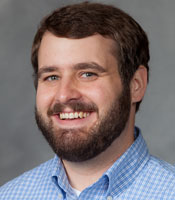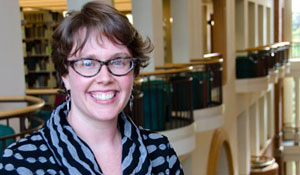E-learning at Wake Forest: A Q&A with Kyle Denlinger
 The concept of learning is typically thought of as something that happens with strictly tangible objects— with books and papers in a brick-and-mortar building. But with the advent of educational technology, education that is translated through the internet— otherwise known as e-learning— is rapidly gaining pace, not necessarily as a complete replacement for conventional learning, but a supplement to it.
The concept of learning is typically thought of as something that happens with strictly tangible objects— with books and papers in a brick-and-mortar building. But with the advent of educational technology, education that is translated through the internet— otherwise known as e-learning— is rapidly gaining pace, not necessarily as a complete replacement for conventional learning, but a supplement to it.
Q: Vision 2020: Charting a Course for Academic Computing at Wake Forest makes three overall recommendations regarding teaching and learning- to align resources, focus our efforts and commit to innovative learning spaces. Where and how does e-learning fit into that?
A: E-learning happens all the time both in and out of the classroom. Professors who deliver content electronically outside of class or who use collaborative or instructional technologies to enhance their face-to-face instruction are engaging their students in at least some form of e-learning. Students who supplement their learning by seeking out materials like YouTube videos or other openly-accessible educational resources are engaging in a kind of informal e-learning. It’s a reality that these technologies are changing how many of us teach and how all of our students learn.
Categories: Faculty News
Open access: What is it? Why do we need it?
 By Sara Hendricks, Wake Forest News Office intern
By Sara Hendricks, Wake Forest News Office intern
Access to scholarship has traditionally been reserved for those who subscribe to academic journals or those who attend or work at an institution with subscriptions. A personal subscription can cost upwards of $1,000 per year. Library subscriptions run much higher, with ZSR’s most expensive journals costing tens of thousands of dollars.
But what if academic research could become more accessible, more immediate and less impenetrable? This is the goal of the open access movement, which aims to provide “free, immediate, online availability of research articles, coupled with the rights to use these articles fully in the digital environment,” according to the Scholarly Publishing and Academic Resources Coalition.
In 2010, the Z. Smith Reynolds Library Librarians’ Assembly adopted an open access policy. However, it applies only to library faculty scholarship, not all faculty scholarship, so there’s room to grow.
Misperceptions that publishing in an open access journal is less prestigious than publishing in a traditional journal abound, but Scholarly Communication Librarian Molly Keener says some of the most respected journals are published open access.
Categories: Guest Post, University Announcement
Second of two 'Vision 2020' forums to be held today
As a reminder, the second of two Vision 2020 open discussion forums for community questions and feedback will be held today, Wednesday, Oct. 22 at 3 p.m. in DeTamble Auditorium.
In May 2014, a committee of Wake Foresters representing various areas of the University completed a review of the technological landscape in higher education and began the important challenge of exploring what the future of collaborative work might look like in the next five years.
After site visits, interviews and research, the committee produced “Vision 2020: Charting A Course for Academic Computing at Wake Forest,” a white paper that envisions how technology changes already underway can support teaching and learning at Wake Forest.
You can read more about Vision 2020 on the Provost’s website.
Categories: University Announcement
A message about technology and its future at Wake Forest
A message from:
School of Business Vice Dean of Programs Gordon McCray
Former CIO, Information Systems and Professor of Physics Rick Matthews, and
Vice Provost and Dean of Z. Smith Reynolds Library Lynn Sutton
Dear Wake Forest Faculty, Staff and Students,
In May 2014, a committee of Wake Foresters representing various areas of the University completed a review of the technological landscape in higher education and began the important challenge of exploring what the future of collaborative work might look like in the next five years.
After site visits, interviews and research, the committee produced “Vision 2020: Charting A Course for Academic Computing at Wake Forest,” a white paper that envisions how technology changes already underway can support teaching and learning at Wake Forest.
From an environmental scan to recommendations regarding teaching and learning, the 27-page report offers informative and insightful details on IT-based technology and higher education. We would like to showcase several important points from the paper as people begin to delve more deeply into Vision 2020.
Categories: University Announcement

